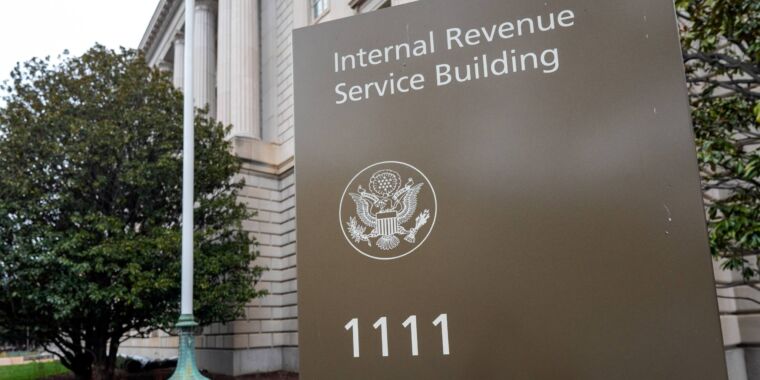Getty Images | J. David Ake
The Internal Revenue Service’s free tax filing service, Direct File, is now available in 12 states for taxpayers with simple tax returns. The service available in English and Spanish underwent “weeks of successful testing” before the launch, the US Treasury Department said today.
“Direct File provides a free, secure option for taxpayers with simple tax situations in 12 states to file their taxes directly with the IRS,” the Treasury Department said. “Direct File is easy to use, with no hidden junk fees, and works as well on a smartphone as it does on a laptop, tablet, or desktop computer. Direct File shows taxpayers the math so they can be sure that their return is accurate, and they are getting the refund they are entitled to.”
You can check whether you qualify to use the system at directfile.irs.gov. Based on the eligibility restrictions in the IRS program, the Treasury Department said it “estimates that one-third of all federal income tax returns filed could be prepared using Direct File.”
In the 12 eligible states combined, the department estimates that 18.7 million taxpayers are eligible for Direct File. That includes a high of 5.2 million taxpayers in California and a low of 80,000 in Wyoming. “Thousands of taxpayers across all 12 states have already successfully filed returns during the pilot’s testing phase,” the Treasury Department said.
The government is calling this year’s version of Direct File a pilot program. It will presumably expand to more states and perhaps have fewer restrictions on who can file in future years.
State tax options vary
Arizona, California, Massachusetts, and New York worked with the IRS to integrate their state taxes into the Direct File pilot, the IRS said in October 2023. The pilot is also available in eight states without an income tax: Florida, New Hampshire, Nevada, South Dakota, Tennessee, Texas, Washington, and Wyoming.
The IRS originally said that Alaska, which also has no income tax, was slated to be part of the pilot. But the state was not included in the end. “The Direct File pilot does not support reporting the Alaska Permanent Fund Dividend for federal income tax reporting purposes,” the IRS was quoted as saying in January.
There are different options for state taxes depending on what state you live in. There’s a free state filing tool for Arizona and New York that integrates with IRS Direct File. Users in California and Massachusetts will be directed to their respective state’s online tax tools for filing state taxes.
What you can and can’t file
Direct File supports employment income, unemployment compensation, Social Security benefits, and $1,500 or less in interest income. But there are many limits that would prevent taxpayers from using the system.
Income types that cannot be reported with Direct File include income from payment apps, online marketplaces, or payment cards; income from independent contractor and gig work; income from rent, prizes, and awards; income from pension and retirement account distributions; allocated tips and unreported tips; and alimony.
Direct File is further limited by the amount of income. You can’t use Direct File if your wages were over $200,000, or $160,200 if you had more than one employer. Direct File also isn’t available to those who use the filing status “Married Filing Separately” and had wages of more than $125,000. For a married couple filing a joint return, there is a combined wage limit of $250,000.
There’s another limit related to how you obtain health insurance. Direct File won’t work if you bought health insurance from a HealthCare.gov marketplace or if you withdrew money from a health savings account. Other types of health insurance are supported.
Direct File supports the Child Tax Credit, the Earned Income Tax Credit, and the Credit for Other Dependents, but does not support other types of credits. Itemized deductions also are not supported, though the IRS says that about 90 percent of people filing federal taxes use the standard deduction.





